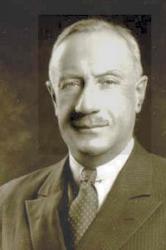Planning worship?
Check out our sister site, ZeteoSearch.org,
for 20+ additional resources related to your search.
- |
User Links
Person Results
John Bacchus Dykes

1823 - 1876 Person Name: John B. Dykes Composer of "ST. AGNES" in Hymns for Today As a young child John Bacchus Dykes (b. Kingston-upon-Hull' England, 1823; d. Ticehurst, Sussex, England, 1876) took violin and piano lessons. At the age of ten he became the organist of St. John's in Hull, where his grandfather was vicar. After receiving a classics degree from St. Catherine College, Cambridge, England, he was ordained in the Church of England in 1847. In 1849 he became the precentor and choir director at Durham Cathedral, where he introduced reforms in the choir by insisting on consistent attendance, increasing rehearsals, and initiating music festivals. He served the parish of St. Oswald in Durham from 1862 until the year of his death. To the chagrin of his bishop, Dykes favored the high church practices associated with the Oxford Movement (choir robes, incense, and the like). A number of his three hundred hymn tunes are still respected as durable examples of Victorian hymnody. Most of his tunes were first published in Chope's Congregational Hymn and Tune Book (1857) and in early editions of the famous British hymnal, Hymns Ancient and Modern.
Bert Polman
John Bacchus Dykes
George Frideric Handel

1685 - 1759 Person Name: G. F. Händel Composer of "BRADFORD (MESSIAH)" in Social Hymns of Brotherhood and Aspiration George Frideric Handel (b. Halle, Germany, 1685; d. London, England, 1759) became a musician and composer despite objections from his father, who wanted him to become a lawyer. Handel studied music with Zachau, organist at the Halle Cathedral, and became an accomplished violinist and keyboard performer. He traveled and studied in Italy for some time and then settled permanently in England in 1713. Although he wrote a large number of instrumental works, he is known mainly for his Italian operas, oratorios (including Messiah, 1741), various anthems for church and royal festivities, and organ concertos, which he interpolated into his oratorio performances. He composed only three hymn tunes, one of which (GOPSAL) still appears in some modern hymnals. A number of hymnal editors, including Lowell Mason, took themes from some of Handel's oratorios and turned them into hymn tunes; ANTIOCH is one example, long associated with “Joy to the World.”
Bert Polman
George Frideric Handel
Irving Maurer

1879 - 1942 Author of "O God hear thou the Nation's Prayer" in Hymns for Today Born: September 2, 1879, Garnavillo, Iowa.
Died: February 27, 1942, Rochester, Minnesota.
Maurer was educated at Beloit College, Beloit, Wisconsin (1904); Yale University (BD, MA, 1908); Carleton College, Northfield, Minnesota (DD); Wooster College, Ohio (LLD 1924); Oberlin College (DD 1925); & Colorado College (LLD 1933). Ordained a Congregational minister, he served at the Jonathan Edwards Church in Northampton, Massachusetts, & Washington Gladden’s First Congregational Church in Columbus, Ohio. He went on to serve as president of Beloit College from 1924 until his death.
http://www.hymntime.com/tch/bio/m/a/u/maurer_i.htm
==========================
Irving Maurer
1924-1942
Excerpted from "Seven Presidents of Beloit College" by Dr. Robert Irrmann:
In 1924 Beloit College turned to its earlier tradition of calling a son of the College to the presidency; on this occasion it was Irving Maurer of the Class of 1904. Irving Maurer had gone from Beloit to Yale, receiving both a Bachelor of Divinity degree and a Master of Arts in 1908. As a Congregational minister, Maurer held two significant pastorates prior to returning to Beloit: that of the Jonathan Edwards Church in Northampton, Massachusetts, and Washington Gladden's First Congregational Church in Columbus, Ohio. Irving Maurer brought a deep feeling for the older Beloit, a broad ranging humanistic outlook, and a devotion to the College Chapel as a forum for all interests of the College. Educated under Eaton's regimen, President Maurer continued to beautify the Vesper Service, stressing the role of music in its heightening effect. The earlier values of the Founders were those professed by President Maurer as animating forces in the life of the College: a non-sectarian, democratic spirit, characterized by simplicity and mental activity and by moral idealism in public life. He saw Beloit College as an institution, "cultural rather than professional, animated by a deep sense of truth, profoundly religious but knowing no antagonism between science and religion." To his students he stressed the charm and attraction of the world of books. His love of the arts was mirrored in the erection of the Theodore Lyman Wright Art Hall. His belief in student collegiality at the outset of a college career is seen in the construction of the men's dormitories in 1927-28. Faithful to the ideals of an earlier Beloit, and to the soundness of a broad humanism, Dr. Maurer carried the College through the depression years of the 1930s, and he presided over America's entry into World War II. Granted an extension of his presidency beyond age 65, so he might preside at the College's Centennial in 1946-1947, an untimely and unexpected death in February 1942 ended his presidency.
http://www.beloit.edu/archives/history/presidents/irving_maurer/
Irving Maurer
R. Francis Lloyd
1871 - 1943 Person Name: Richard Francis Lloyd Composer of "CLAIRVAUX" in Hymns for the Living Age Music:
CELESTIAL VOICES
CLAIRVAUX
STARS OF EVENING
WINTON
http://www.hymntime.com/tch/bio/l/l/o/lloyd_rf.htm
R. Francis Lloyd


 My Starred Hymns
My Starred Hymns


